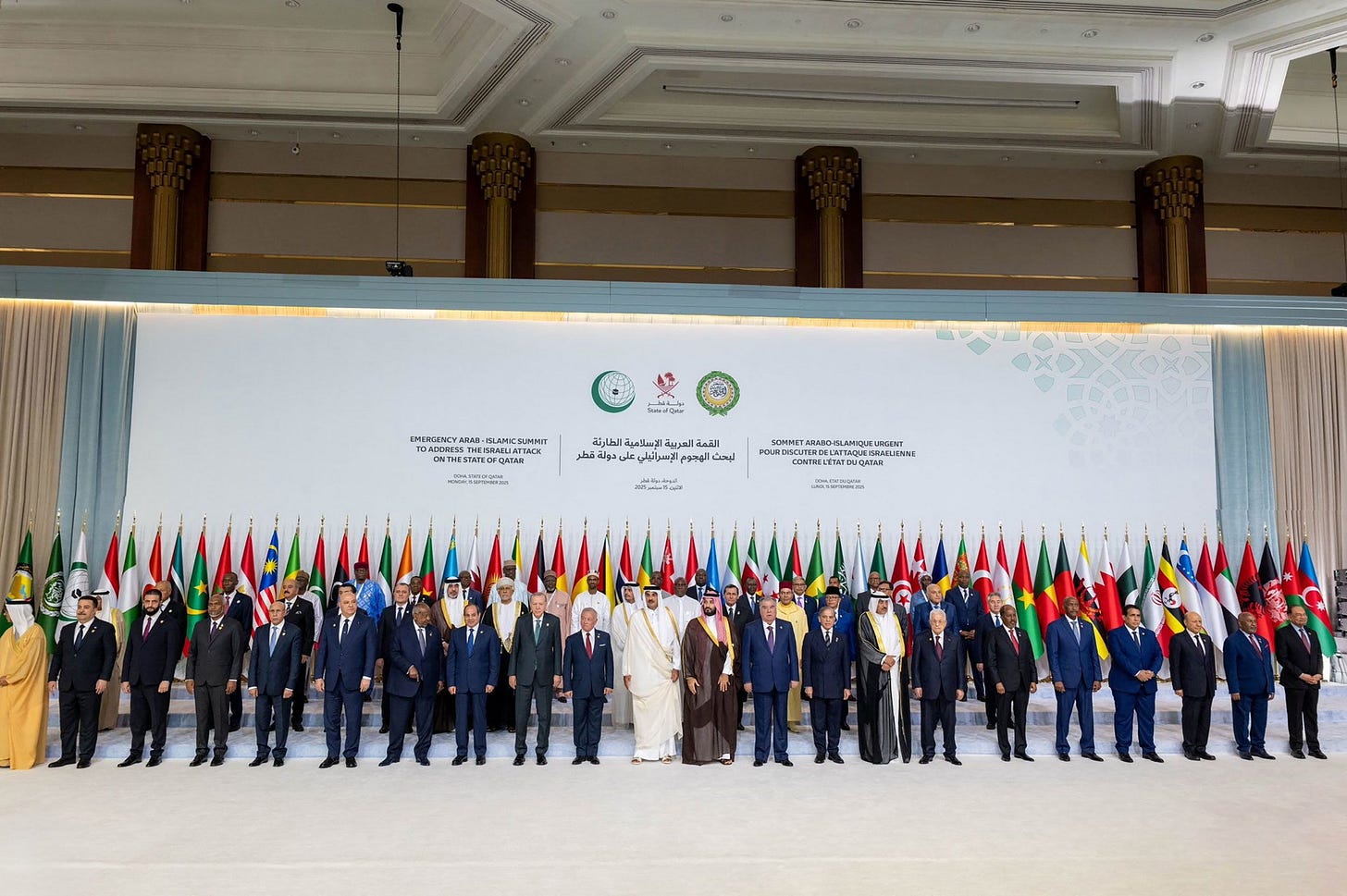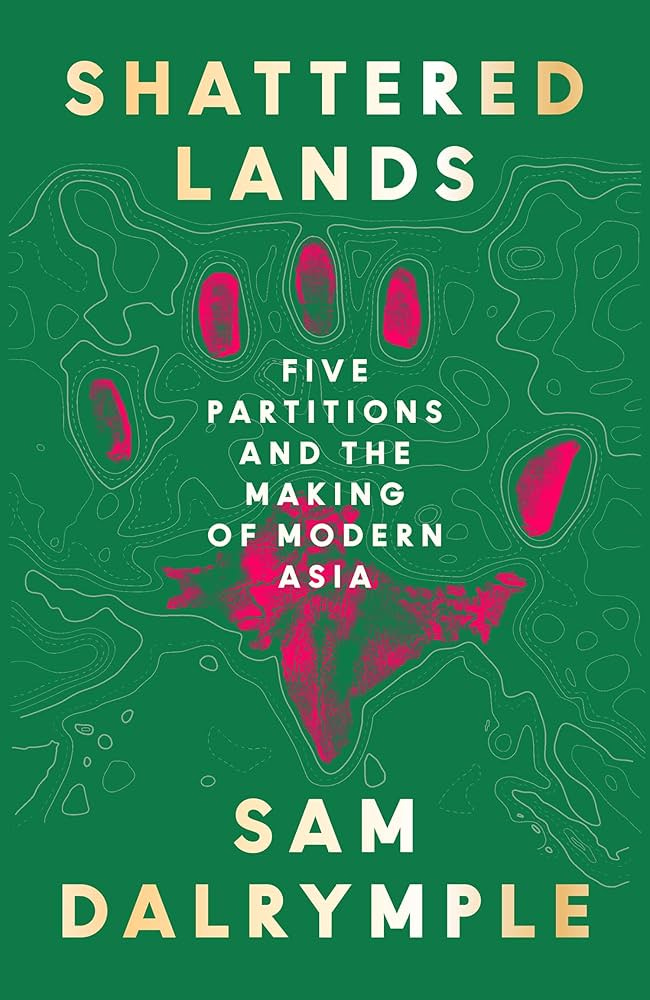The Gulf Nashra Weekly Digest
Arab-Islamic Emergency Summit Held in Doha; Saudi Arabia and Pakistan Toughen Defence Bond; GCC Central Banks Follow U.S. Federal Reserve on Interest Rates.
Media Coverage
Geopolitics
“Qatar hosts Arab-Islamic emergency summit over Israeli strike on Doha.” BBC, September 15, 2025.
“A draft resolution seen by the Reuters news agency condemns what it calls Israel's "hostile acts including genocide, ethnic cleansing, [and] starvation", which it says threatens "prospects of peace and coexistence". Israel has strongly denied such allegations.”
Go Deeper: “Are Arab nations going to impose real costs on Israel?” Atlantic Council, September 18, 2025.
“Gulf states activate joint defense measures after Israeli attack on Doha.” Alarabiya, September 18, 2025.
“It stressed that an attack on Qatar is an attack on all GCC member states and voiced full support for measures taken by Doha to defend its sovereignty and territorial integrity.”
Go Deeper: “Israel's Strike on Qatar Tilts the Balance Against Gulf-Israel Relations.” Mahdi Ghuloom, The Institute for Peace & Diplomacy, September 16, 2025.
“Saudi Arabia, nuclear-armed Pakistan sign mutual defence pact.” Reuters, September 18, 2025.
“Asked whether Pakistan would now be obliged to provide Saudi Arabia with a nuclear umbrella, a senior Saudi official told Reuters: "This is a comprehensive defensive agreement that encompasses all military means."”
Go Deeper: “As US reliability falters, Saudi Arabia turns to a nuclear-armed ally.” CNN, September 18, 2025.
“India says it expects Saudi Arabia to mind 'sensitivities' after pact with Pakistan.” Reuters, September 19, 2025.
“India and Saudi Arabia have a wide-ranging strategic partnership which has deepened considerably in the last few years," Indian foreign ministry spokesperson Randhir Jaiswal told reporters during a weekly news briefing.”
“We expect that this strategic partnership will keep in mind mutual interests and "sensitivities," he said.”
Go Deeper: “Saudi-Pakistan Mutual Defence Pact: Implications for India, IMEC, and US Influence in the Gulf.” Italian Institute for International Politics Studies, September 19, 2025.
“Exclusive: UAE could downgrade diplomatic ties if Israel annexes West Bank, sources say.” Reuters, September 18, 2025.
“The sources, who all spoke on condition of anonymity, said Abu Dhabi was not considering completely severing ties, although tensions have mounted during the almost two-year-old Gaza War.”
Go Deeper: “Report says UAE won’t cut Israel ties if West Bank annexed; Gulf sources push back.” The Times of Israel, September 18, 2025.
Market & Economy
“GCC central banks cut interest rates by 25 bps following Fed’s move.” Arab News, September 18, 2025.
“Central banks in Gulf Cooperation Council countries cut interest rates by 25 basis points after the US Federal Reserve lowered its benchmark range to 4 percent to 4.25 percent, its first reduction since December.”
Go Deeper: “The state of de-dollarisation in the Gulf region.” IISS, July 2023.
“Carrefour exits more GCC countries: Kuwait stores shut after Bahrain, Oman, Jordan.” Gulf News, September 17, 2025.
“Yet the shift to HyperMax suggests a calculated pivot. Industry watchers say the move could reflect MAF’s push to strengthen control over its retail strategy by moving away from a global franchise model to its own proprietary brand.”
Go Deeper: “Examining the advantages and disadvantages of international franchising and licensing from both legal and business perspectives within GCC region.” Anas Al Bakri and Nazzal Kisswani, Qatar University, January 2024.
Domestic Issues
“SAR 6.5 billion is the volume of financing provided by the Social Development Bank since the beginning of 2025.” Al-Jazirah, September 18, 2025.
“This financing was distributed as follows: SAR 2.5 billion to support freelancers and productive families, benefiting 53,000 citizens, including 14,500 in the third quarter; more than SAR 2.4 billion in financing for small and emerging enterprises, benefiting 7,300 enterprises, including 2,400 in the third quarter; and SAR 1.6 billion in social financing, benefiting 30,000 citizens, including 10,000 in the third quarter.”
Go Deeper: “The Saudi ‘Social Contract’ Under Strain: Employment and Housing” Mark. C. Thompson, POMEPS Studies, October 2018.
“Bahrain King orders passport renewal for citizens stripped of Kuwaiti nationality.” Gulf News, September 17, 2025.
“Bahraini citizens who recently lost their Kuwaiti nationality have been granted renewed Bahraini passports following a royal directive by King Hamad bin Isa Al Khalifa.”
Go Deeper: “From Citizen to Stateless: The Quiet Crisis of Nationality Stripping in Kuwait and the Gulf.” Medium, April 15, 2025.
Gulf Opinions
This week, Gulf commentators concentrated on the Arab-Islamic Summit in Doha, convened on September 15 in response to Israel’s attack on Qatar. From Saudi Arabia, Musaed Al Osaimi underscored the strategic timing of the gathering, noting that although it was primarily a reaction to Israeli aggression, it carried dual significance: it coincided with United Nations efforts to recognize the State of Palestine and reflected a shifting global landscape, particularly within the United States, where growing segments of society increasingly sympathize with the Palestinian cause against Zionist expansionism. For Al Osaimi, the most consequential outcome of the summit was its renewed call for the two-state solution. From Kuwait, Dr. Abdulhamid Al Shaiji similarly emphasized the event’s broader implications, describing it as a “test” of whether Gulf, Arab, and Islamic states can genuinely unify their decisions. He insisted that such cohesion constitutes a formidable strategic force across “military, economic, media, and technical” domains, urging the adoption of a comprehensive Gulf-Arab-Islamic defense charter that would encompass a joint military operations room, a unified air and missile defense system, and a rapid-response force capable of safeguarding border regions. This theme of solidarity was echoed in Bahrain, where Mona Ali Al Mutawa highlighted that the summit’s final communiqué not only reaffirmed support for Palestine but also conveyed significant “political messages” to Israel and to the international community, particularly the United States. In the United Arab Emirates, Salem Al Nuaimi likewise praised the gathering, framing it as an explicit demonstration of the indivisibility of Gulf sovereignty and security. Yet, he also warned that the Israeli strike represents a challenge to the “credibility of international law,” given the possibility of similar attacks on other Gulf states under fabricated pretexts.
Omani commentators, however, adopted a more skeptical stance. Khaled Al Marhoon argued that the outcomes of the Doha summit were indistinguishable from previous Arab meetings, marked by lofty “condemnations” and eloquent rhetoric yet devoid of tangible measures to deter Israel. He pointed to the grim reality that “only a few hours, no more than a handful, had passed since the summit ended when [Israel] launched the largest ground invasion of Gaza, accompanied by unprecedented bombardments of innocent civilians.” Masoud Al Hamdani concurred, writing sarcastically that even states which had “normalized” relations with Israel “did not withdraw their ambassadors” after Qatar was targeted, underscoring the event’s largely symbolic nature. By contrast, Qatar’s Dr. Abdulla Al Amadi struck a more balanced tone, contending that the summit achieved two crucial objectives: it secured Arab-Islamic “solidarity” and exposed Israel’s “treachery” against international law and treaties. Nevertheless, Al Amadi conceded that this success remains “incomplete,” as “the absence of practical measures and steps that can be implemented on the ground” continues to undermine the effectiveness of the summit, a view shared by many observers and analysts.
Other Gulf Opinions
“Morgan Ortagus, in all her elegance, raises her hand in the Security Council against the resolution to halt the genocide in Gaza. Beauty may capture the camera, but it cannot conceal the brutality of the veto.”
Dawood Alshirian, X, (Saudi Arabia), September 19, 2025.
“The political and leadership disparities among the Gulf states render any integrative project fragile and liable to collapse at the first sign of discord. Some smaller states aspire to roles that exceed their actual weight, generating sensitivities and perpetuating tensions among the Gulf countries. On the military front, weak domestic arms production and excessive reliance on arms purchases make these financially wealthy states strategically impoverished and fragmented. This reality explains the proliferation of foreign military bases on their territories.”
Shaher Al Nahari, Makkah, (Saudi Arabia), September 18, 2025.
“Congratulations to Saudi Arabia and Pakistan on the strategic agreement. This is the best response to the Israeli aggression against Qatar. Saudi Arabia has now chosen the right ally.”
Abdullah Al Nefisi, X, (Kuwait), September 18, 2025.
“Tomorrow, after lowering interest rates, the American president will add a new “victory” to the list he proudly boasts of. He continues to insist that he has ended seven wars—wars we do not see, but he claims to, and speaks about at length—while remaining silent on the wars he himself ignited and continues to fuel!”
Mohamad Yousef, Al Bayan, (UAE), September 18, 2025.
“This Israeli arrogance, which has led to the bombing of several countries in the region and the violation of airspace, may fuel greater populism within Israeli society, particularly in the run-up to the October 2026 elections. Yet the snowballing scenes point instead to mounting diplomatic pressure on Netanyahu and growing isolation for Israel. We saw this in the Security Council statement, where the United States refrained from exercising its veto power as it had done dozens of times in the past. We also see it in the success of Saudi-French efforts to persuade 142 countries at the United Nations to vote in favor of the Palestinians’ right to an independent state, as well as in the broad solidarity expressed with the State of Qatar.”
Abdulrahman Al Trairi, Okaz, (Saudi Arabia), September 15, 2025.
Picks
Book: Dalrymple, Sam, “Shattered Lands: Five Partitions and the Making of Modern Asia.” William Collins, June 19, 2025.
Analysis: “Beyond the Hype: Pakistan-Saudi Defense Pact Is Not a Saudi Nuclear Umbrella.” Rabia Akhtar, Belfer Center at Harvard University, September 18, 2025.
Analysis: “Other Gulf states will compete with Oman’s incentives.” Oxford Analytica, August 29, 2025.
Research: “Small state strategies towards military self-reliance: a comparative study of the UAE and Singapore.” Jean-Loup Samaan, Asian Security, August 25, 2025.
Research: “India’s Evolving Approach Towards the Gulf: From Bilateralism to Regionalism.” Muddassir Quamar, Strategic Analysis, August 3, 2025.
Podcast: “What Are the Gulf’s Options After the Bombing of Qatar?” Interview with Abdulaziz bin Saqr, Qisas Podcast, September 19, 2025. [English Subtitle].
Podcast: “Inside the Royal Court: An Exclusive Behind-the-Scenes Special.” The Mo Show, August 31, 2025.
Interview: “H.E. Yasir Al-Rumayyan conversation with David Rubenstein.” The Economic Club of Washington, D.C, September 9, 2025.



